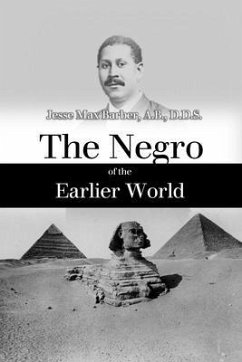"Barber was one of the founding members of the Niagara Movement." -Jane Adams
"An outspoken critic of racial injustice, he argued fervently for black civil rights and stressed the importance of chronicling historical events for future generations." -Blackpast.org
"The nation's most distinguished black periodical was Jesse Max Barber's 'The Voice of the Negro' begun in Atlanta in 1904." - Black Georgia in the Progressive Era, 1900-1920
"A race without traditions and without history is most likely to be a race without backbone and without self-respect. Minus these two elements, ambition sags," writes Barber in introducing his 1915 book "The Negro Race of the Earlier World."
Barber further notes that "Negroes do not themselves know that their race has any history. It has only been within the last dozen years of my life that I knew that the Negro had any history. It is not taught in the schools. It is not printed in the newspapers. Our fathers did not tell it to us because they did not know."
Considered more radical than civil rights activists such as Booker T. Washington, Barber's commentary on the 1906 Atlanta race riots published in the New York World caused so much animosity that Barber had to flee Atlanta vigilantes to Chicago.
Born to former slave parents, Jesse Max Barber (1878 - 1949) was educated at Benedict College and Virginia Union University, where he was student editor of the University Journal and president of the Literary Society. In 1903 he began working for the Voice of the Negro, becoming its editor-in-chief. By 1906 the Voice was the leading black magazine in the United States, with a circulation of 15,000.
After fleeing vigilantes and settling in Chicago, it became apparent that Barber's radicalism had made an enemy of Booker T. Washington, whose interventions caused Barber to lose jobs as a newspaper editor in Chicago and as a teacher in Philadelphia. So Barber became a dentist, but remained committed to social activism; from 1919-1921 he served as president and on the executive committee of the NAACP's Philadelphia branch.
In 1915, Barber published the short 18-page book "The Negro of the Earlier World: An Excursion Into Negro Ancient History," in which he notes that "we were taught to believe that the history of the race began with slavery, that we were snatched from the savagery of Africa to be sheltered under the protecting wing of American Christianity while we were being civilized; in short, that slavery was a great blessing.
"Nothing is farther from the truth. No institution the world has ever seen did more damage to humanity than the rape of the continent of Africa for the gratification of the laziness and commercialism of the new world."
Barber makes the point, with numerous historical examples, that "Negroes have distinguished themselves in every age and in every land. Back down the paths of an unknown age they set the pace for the world. They rocked civilization in the cradle."
"An outspoken critic of racial injustice, he argued fervently for black civil rights and stressed the importance of chronicling historical events for future generations." -Blackpast.org
"The nation's most distinguished black periodical was Jesse Max Barber's 'The Voice of the Negro' begun in Atlanta in 1904." - Black Georgia in the Progressive Era, 1900-1920
"A race without traditions and without history is most likely to be a race without backbone and without self-respect. Minus these two elements, ambition sags," writes Barber in introducing his 1915 book "The Negro Race of the Earlier World."
Barber further notes that "Negroes do not themselves know that their race has any history. It has only been within the last dozen years of my life that I knew that the Negro had any history. It is not taught in the schools. It is not printed in the newspapers. Our fathers did not tell it to us because they did not know."
Considered more radical than civil rights activists such as Booker T. Washington, Barber's commentary on the 1906 Atlanta race riots published in the New York World caused so much animosity that Barber had to flee Atlanta vigilantes to Chicago.
Born to former slave parents, Jesse Max Barber (1878 - 1949) was educated at Benedict College and Virginia Union University, where he was student editor of the University Journal and president of the Literary Society. In 1903 he began working for the Voice of the Negro, becoming its editor-in-chief. By 1906 the Voice was the leading black magazine in the United States, with a circulation of 15,000.
After fleeing vigilantes and settling in Chicago, it became apparent that Barber's radicalism had made an enemy of Booker T. Washington, whose interventions caused Barber to lose jobs as a newspaper editor in Chicago and as a teacher in Philadelphia. So Barber became a dentist, but remained committed to social activism; from 1919-1921 he served as president and on the executive committee of the NAACP's Philadelphia branch.
In 1915, Barber published the short 18-page book "The Negro of the Earlier World: An Excursion Into Negro Ancient History," in which he notes that "we were taught to believe that the history of the race began with slavery, that we were snatched from the savagery of Africa to be sheltered under the protecting wing of American Christianity while we were being civilized; in short, that slavery was a great blessing.
"Nothing is farther from the truth. No institution the world has ever seen did more damage to humanity than the rape of the continent of Africa for the gratification of the laziness and commercialism of the new world."
Barber makes the point, with numerous historical examples, that "Negroes have distinguished themselves in every age and in every land. Back down the paths of an unknown age they set the pace for the world. They rocked civilization in the cradle."
Dieser Download kann aus rechtlichen Gründen nur mit Rechnungsadresse in A, D ausgeliefert werden.


